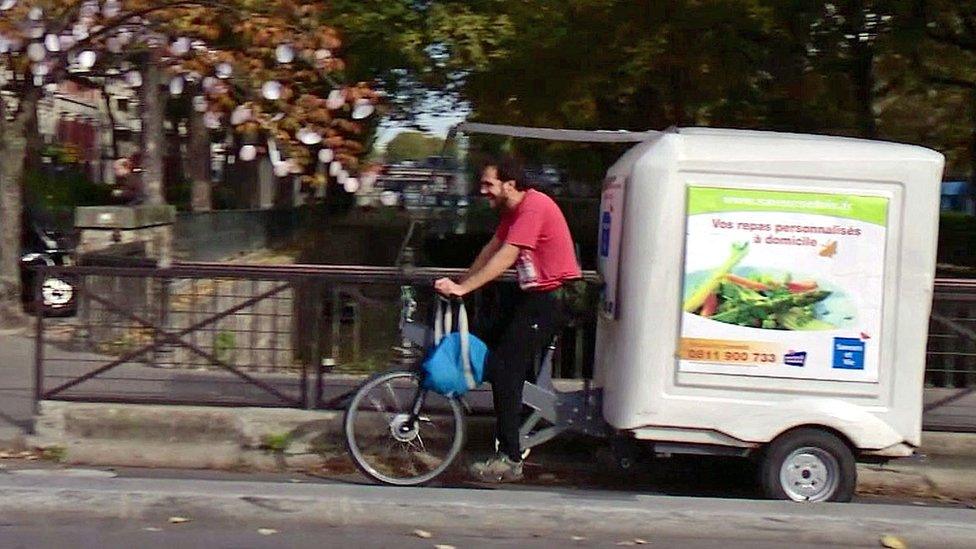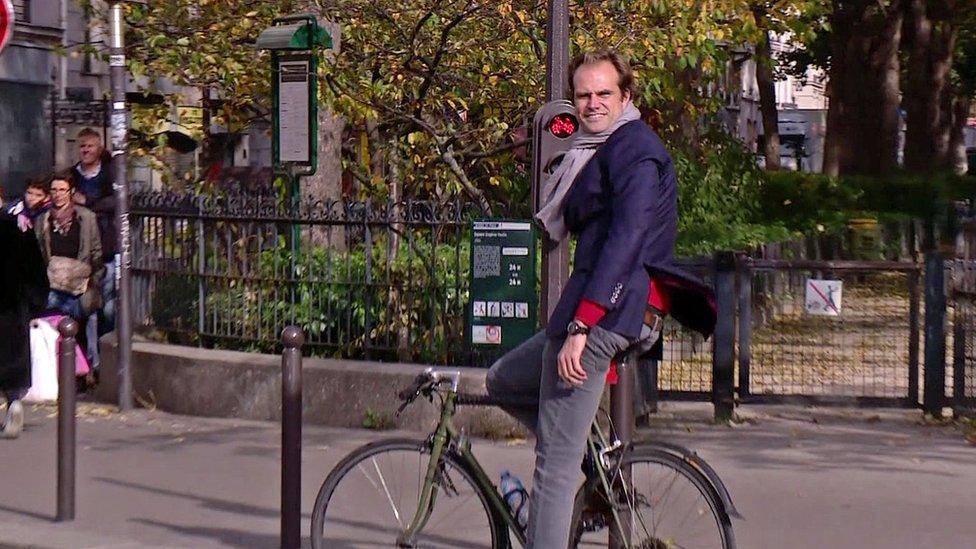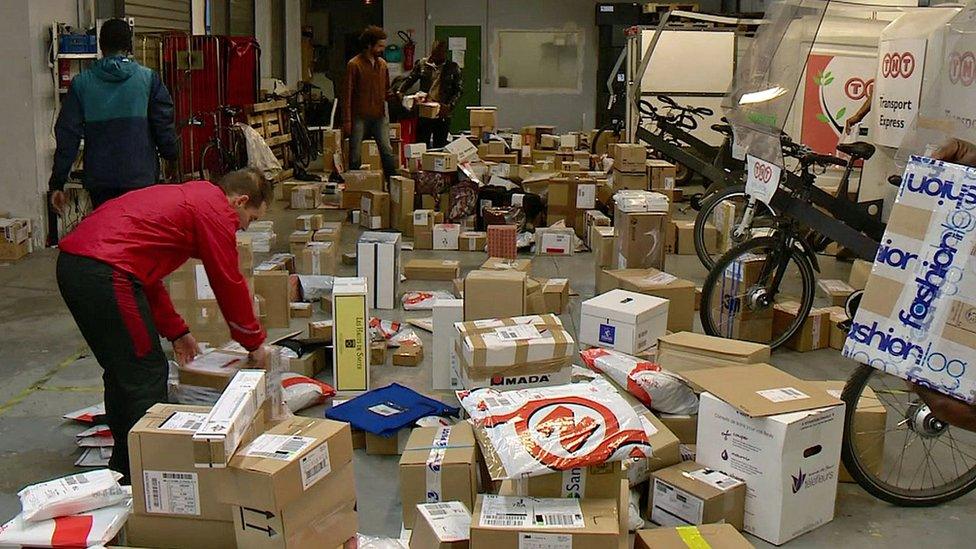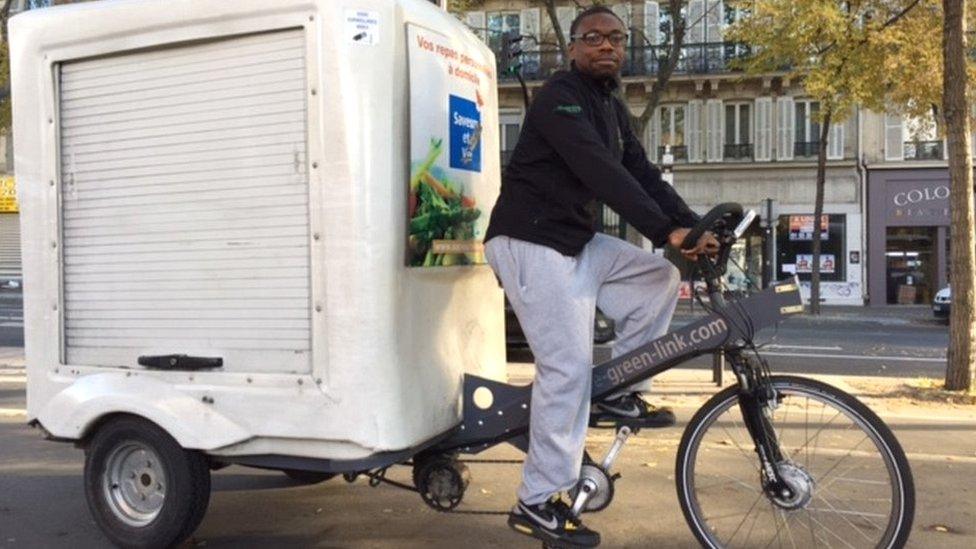Can pedal power help deliver a green logistics sector?
- Published
Michael Darchambeau 'This is all about clean energy'
"History is coming. In fact history is here." These were the words of French President Francois Hollande at the end of this month's global climate change summit in Paris.
But if the world really is on the brink of a low carbon future - it will be up to small business owners like Michael Darchambeau to make it happen.
He's the co-founder and chief executive of The Green Link - a "green" delivery company.
"We are delivering parcels around Paris," he explains at one of the company's two busy sorting offices in the centre of the city. "This is all about clean energy."
The firm was launched in 2010 with just €10,000 (£7,300; $10,900) in personal savings. Things have changed.
"We are delivering to 2,000 customers a day using 34 electric cargo bikes and seven electric small vans," he tells me.
Their customers range from huge multinationals to small traders, and he has a team of 44 full-time and 10 part-time employees.
Beating the traffic
Michael claims a zero carbon footprint for his service, which performs the last leg of a journey for parcels which may have begun on the other side of the globe.

The firm delivers to 2,000 customers a day
His firm works with major courier companies, providing the final link in their delivery chain.
Customised electric cargo bikes use cycle lanes around the congested city in order to outpace their fuel-driven four-wheel rivals. They don't just carry goods either.
A deal with the ecology-minded city hall in Paris also means they can serve up meals on wheels to housebound citizens.
The idea for the business crystallized while on a trip to New York. He saw the bicycle couriers carrying documents and realised the potential for taking the idea further.
"To be green it's not like in the past, eating like farmers," he insists.
"Today we need to go back to the roots but enjoying the technology of the day. And this is the future - to use technology in the service of a better development of the planet."
The French capital was for him a perfect choice to start the business - he describes it as the most traffic-congested city in Europe.

Michael co-launched the firm in 2010 with just €10,000 in personal savings
Though that's a view that might be contested by frustrated London courier agencies or a Brussels firm waiting on an important delivery.
Cheaper oil
Michael is keen on workforce flexibility and so, in addition to staff he has 15 freelancers on his books.
Many of his employees look upon this as their second job. When they are not acting, painting, drawing or working at a myriad of other activities they are ferrying parcels for the company.
All this in a country where freelancing is hardly the norm. It's a model he needs in a business where demand can be seasonal. At Christmas time he may use a 100 couriers but by the start of the New Year just 10.
For Michael, this is all part of the entrepreneurial spirit which he has brought to the company along with his passionate belief in the ecological cause.
But the green transport isn't having it all its own way according to Sony Kapoor from the think tank Re-Define.
He says the plunge in oil prices has made it easier for businesses and consumers to carry on using petrol and diesel. And he argues that governments should step in to make sure clean energy businesses survive and prosper.

Cheaper oil prices have lessened the pressure on many firms to switch to alternative energy sources
"This would be the perfect time to make sure the greening of the transport sector is encouraged." He says that radical action is needed.
"Increasing tax on oil at the pump would make sure that the real cost doesn't fall."
It is true this would make it easier for the green sector to compete. But do governments have the political stomach for such a move?
"A number of governments in the developing world have taken the opportunity of falling oil prices to remove fossil fuel subsidies," he maintains.
"Surely if they can do it there, western countries can do it as well."
'Green jobs'
Away from the political arguments, Michael is determined to build on what he's achieved so far. He has an annual turnover of €1.3m and is hoping to go into profit next year. But he has plans to go beyond that.

The Green Link employs 44 full time staff - who pedal around Paris on cargo bikes
"I want my company to be developed in every city in Europe, maybe in the world, by other people like me, who want to jump on their bike, who want to make the city greener and create employment."
Michael is utterly passionate about his company but when it comes to the crunch he says the environment trumps all.
"It's much more important than business" he explains." The environment, when it's destroyed you cannot restore it."